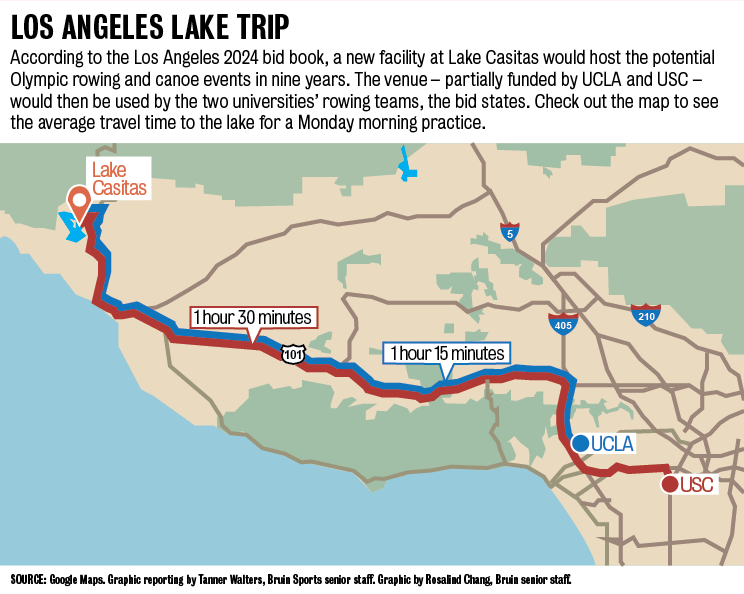Tanner’s Take: LA’s 2024 Olympic Games bid includes vague promises


By Tanner Walters
Sept. 4, 2015 3:00 p.m.
I have lived the 4:55 a.m. wake-up calls.
It was only four months, but my time with the UCLA men’s rowing team gave me the utmost respect for the athletes – male and female – who are able to fight past every mental and physical barrier to compete on the water.
Those mornings at Marina Del Rey left me with plenty of connections within the UCLA rowing community, so it was an exciting moment when I spotted an interesting detail in Los Angeles’ 2024 Olympic bid last week.
According to the Los Angeles 2024 Exploratory Committee’s bid book, a new $110 million rowing venue – funded, in part, by USC and UCLA – would be built at Lake Casitas for the Olympics.
That’s no small chunk of cash, and it immediately raises the red flag of another expensive Olympic venue that is left to little usage once the festivities are over. The bid book has the solution, though.
“What is the post-games use?” the book asks itself. “Post-games, the facility will be used by local university rowing teams (USC, UCLA).”
Now we’re talking.
The document doesn’t detail exactly how the rival schools would use it, but one would assume that a new nine-digit facility would become the centerpiece to both Trojan and Bruin rowing programs. The Division I women’s teams would have a brand new recruiting mecca, the club men’s teams would benefit from the amenities and the expensive venture would impact hundreds of student-athletes annually.
Not being a California native, I realized I had no idea how far the lake is from campus, and that’s where everything began to fall apart.
Lake Casitas sits 70 miles northwest of Westwood, an hour-and-15-minute drive with clear roads and up to a two-and-a-half-hour journey during rush hour.
Traffic notwithstanding, that distance is simply not practical for daily rowing practices.
The boathouse at Marina Del Rey is just 20 minutes from campus. Vans leave at 5:20 a.m., shells are in the water by 6 a.m., everybody is out by 8 a.m. and back to campus for classes at 9 a.m.
A jaunt to Lake Casitas would mean leaving at 4:30 a.m. – waking up even earlier than that – and getting back to campus for 10 a.m. classes, if rush hour traffic is forgiving.
When I asked Victoria Rhee, a rising second-year coxswain on the men’s rowing team, about the possibility of waking up an hour earlier for water practices, she quickly balked at the idea.
“So many people would quit,” she said.
Would the whole plan ever work?
“I don’t think so,” Rhee said. “To race on for sure, but practice probably not.”
Okay, so maybe USC and UCLA would just compete in a couple annual regattas on the lake after 2024, but does that sporadic use justify the $110 million price tag?
Currently, public support for the Los Angeles Olympic bid sits around 81 percent – an overwhelmingly positive number – but that support comes from promises of a fiscal and practical games.
When the bid explicitly states that USC and UCLA will use the new venue post-games, I think the average citizen who hasn’t been immersed in college rowing culture is assuming the schools will be there for more than a few regattas every year.
Los Angeles 2024 is apparently willing to tout this vague promise, but reality says that there is nothing feasible about UCLA or USC traveling to Lake Casitas on a consistent basis.
The biggest problem with this proposal is that it is either incredibly deceptive or horribly organized. I’m not sure which one is worse.
As of Friday afternoon, the UCLA Athletic Communications department was unable to confirm whether or not the women’s rowing program had been consulted about the use of a Lake Casitas facility.
The men’s rowing program had heard nothing of the proposed new facility, according to men’s varsity coach Scott Charette. UCLA media relations did not return requests for comment.
If the committee is willing to publicly advertise that they have a plan in place, shouldn’t they have at least had some conversations about the basic functionality of the proposal?
I’m not saying that they need to have everything figured out – we’re still nine years away from the Opening Ceremony – but the bid book was used to garner support from both the public and the City Council, which voted Tuesday to approve an agreement for Mayor Eric Garcetti to pursue the bid.
It remains possible that the women’s team was consulted, but that is highly unlikely since the Athletic Communications department knew nothing of the Los Angeles 2024 proposal.
The Olympic organizers owe it to the public to clarify the exact post-games use rather than simply advertising a vague solution.
Here, how about this: “The $110 million Lake Casitas facility will be used by local university rowing teams (USC, UCLA) … two or three times annually … hopefully … we’ll talk to them soon.”
On the surface, the Los Angeles 2024 bid feels solid, but these proposals need to be based in reality rather than just ideas that sound good on paper.


